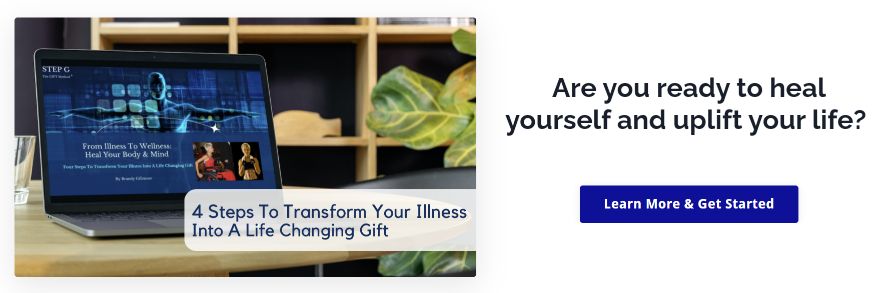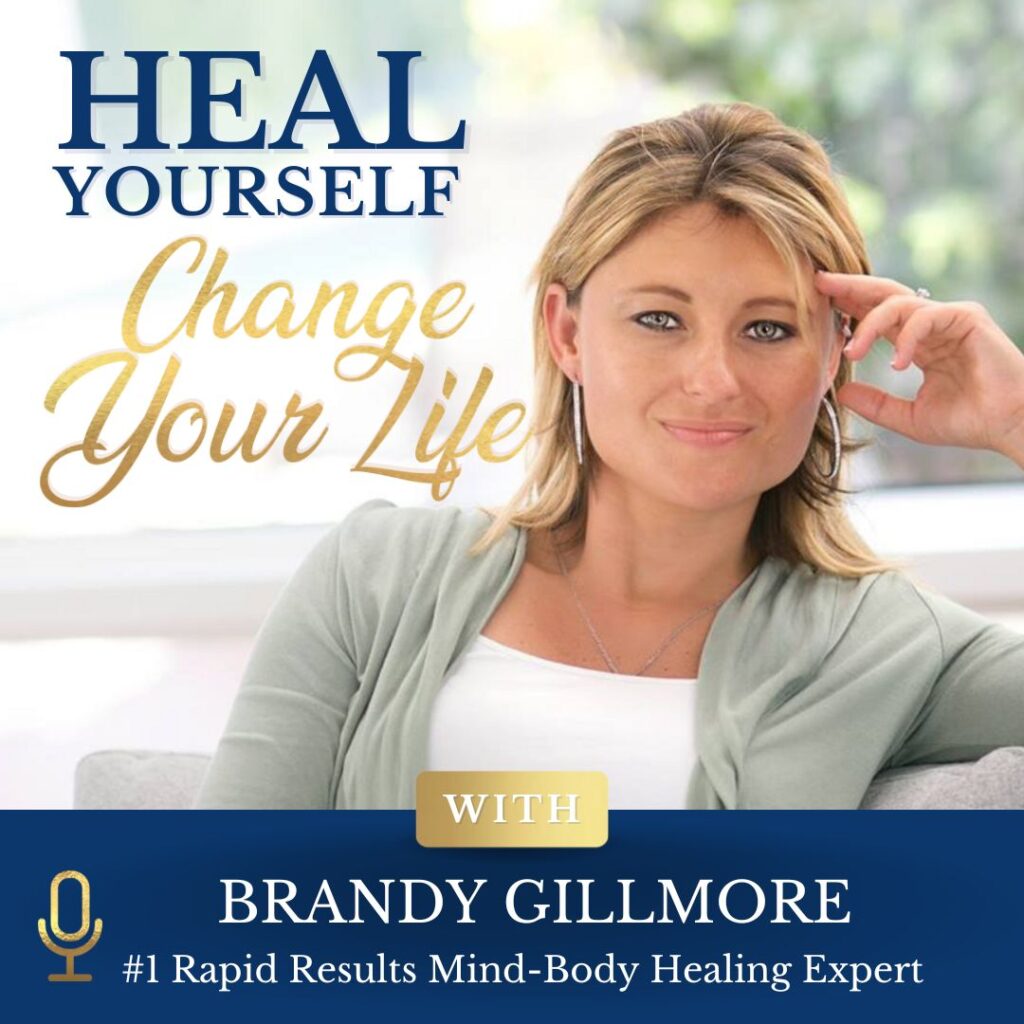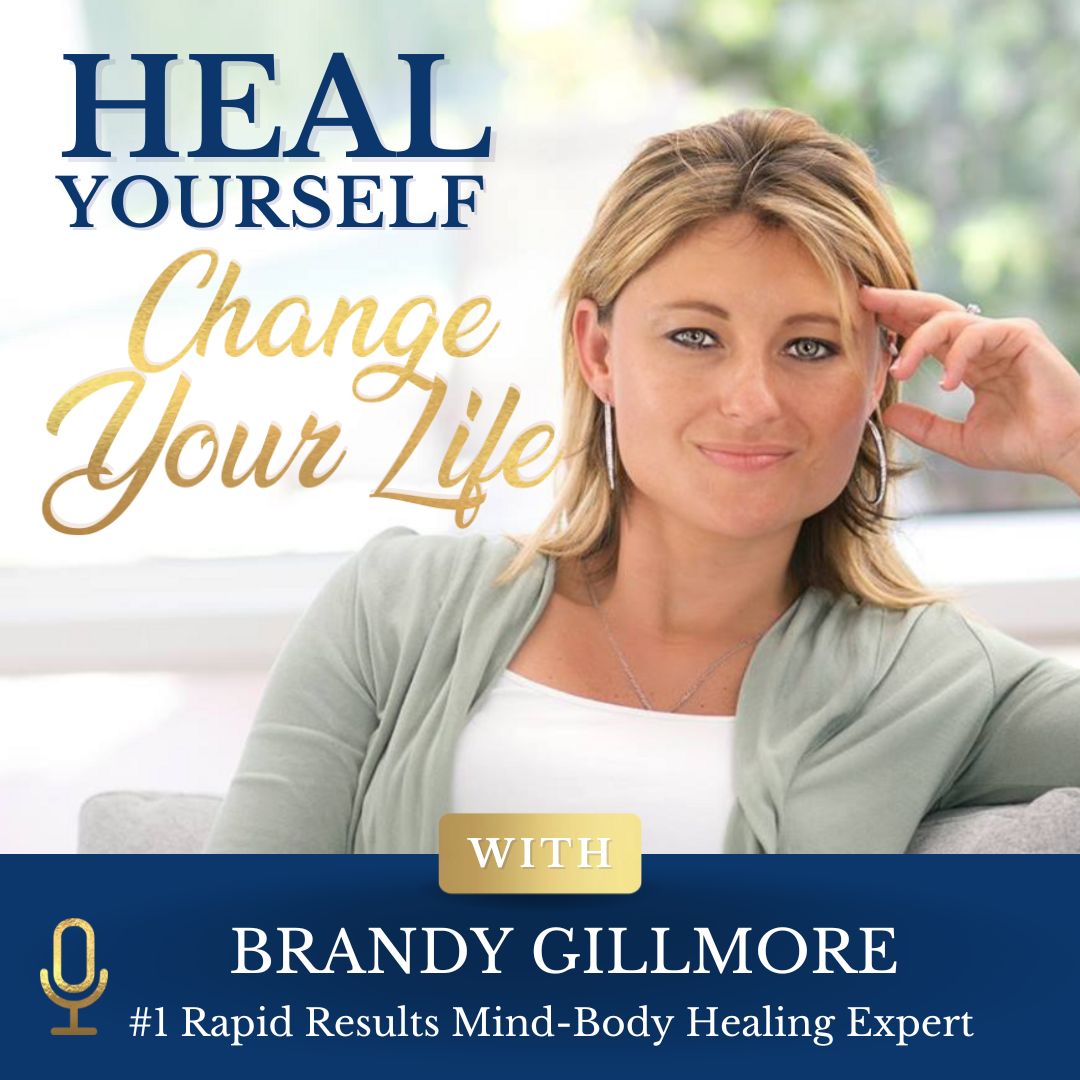Click here to listen to episode IQ-182
Please note: These are computer generated transcripts of the Heal Yourself, Change Your Life Podcast Episodes. If you have any questions or need assistance, please reach out to us at support@brandygillmore.com
Welcome to Heal Yourself, Change Your Life. My name is Brandy Gillmore, and after recovering from my own life changing injury, it's become my mission to share with others the same discoveries I made that changed my health and my entire life. Our minds are truly incredible. The placebo is proof of this.
Each week, I will take this simple awareness to a whole new level. I will even coach live callers to free themselves of physical pain using only their mind. And then I'll provide you with a combination of practical and spiritual insights that you can use to master your mind and your body. Your emotions and your energy to help you heal your health, yourself and your life.
Let's begin.
Hello and welcome to today's quick IQ episode where we talk about insights and questions. And today I want to take a bunch of insights and mix it with a bunch of questions. And basically I've got several questions that came in and also want to share with you an insight based on last week's, episode and kind of bring it all together.
And so that's what we're going to do on today's quick IQ episode. Now, the thing I want to start with is kind of just going into the simplicity of getting change, of healing yourself, the simplicity of it, and then also some of the complexities. And so I'm going to kind of weave everything together, if you will, of course, starting with the simplicity now with the simplicity, the way that you want to think about mind body healing is literally like learning any other skill.
Like when you think about it as a child, as a toddler, when we learn how to walk, What do we do? We stand, we fall, we stand, we fall. We make distinctions and we get better and better at it. We learn from it and we move forward. Or even when we learn how to read or write, we say cat, dog, you know, we learn how to read or write our name.
First we write it upside down and backwards and whatnot. So we really want to learn how to do it and the distinctions. And I would say, While that's a simplicity, that's how we'd learn anything. You know, you'd start a new job. What do you do? You, you start things, you get better and better and better at them.
So while it's a simplicity, it can also be a complexity for this reason, because a lot of times people will say, just believe, or don't believe. Just, all you have to do is just meditate, meditate, meditate, think positive, and just believe, and it's going to just take a while. And so I got stuck in this in my own life where I thought, okay, well, I must be doing everything right.
I'm meditating for hours and hours and hours, and I'm thinking positive, and I'm doing all the things, and the affirmations, and the positive, and the binary, like all of the things, and I'm just waiting for my body. And so while I thought initially, you know, 20 years ago when I first started this journey and convincing myself to believe I was already healed and all of those things.
So I stopped really, you know, I, I thought, well, I'm doing everything right. I'm just waiting. And I would say, so that's a tricky part of this is that when we think that we're doing everything right, Then we're just waiting. We think that the body takes a long time, and I would say that can be a trap. And so, well, simplicity of saying, okay, well, any skill that we do, we learn, we get better, and make distinctions.
And, and so, that's the way you want to approach this, is exactly like that, is to understand that you'll want to make distinctions. And on my own journey, one of the Profound distinctions that was eye opening was the awareness that people with multiple personality disorder could get changes really fast.
You know, they could change from one illness to another illness in a minute. And kind of to unpack this a little bit more. Um, something I, if you're new to this, you know, something that I always talk about is research on people with multiple personality disorder has shown that they can have one illness in one personality and a completely different illness in a different personality.
And it can happen. You know, as soon as they switch illnesses. So, and by the way, if you're somebody who's been here for a long time, you hear me talk about that all the time because it was mind blowing to me. And so my point is the simplicity of continuing to make distinctions. You want your brain in that space to say, okay, I need to make these distinctions.
And it's not that you need to reinvent the whole wheel, but these distinctions Inside of yourself, of understanding your emotions and your clarity and your mindset. So that's a place where you want to be. That's the simplicity of any skill of learning how to do it. Now that goes to the second insight that I want to share as far as simplicity is this.
is that ultimately, just like we retrain our nervous system or retrain ourselves to do something in a different way, it does take follow through. Now, follow through, if we follow through and do something, we can follow through and make a change. You know, we can follow through and, and catch a ball, or we can follow through and teach ourselves to create a new habit, you know, and so follow through is important to create the shift.
And sometimes people go, Oh, well, it takes follow through. Yes. But like anything, it takes follow through. You know, if, if you're going to learn a new language, it takes follow through. You want to learn a new language. You want to learn how to do any skill to do it automatically. It takes some follow through.
Uh, learn the alphabet. It takes follow through. And so that's another insight that you want to take about, think about is that as you do get that information in your mind, it takes follow through. Now if you think about the last podcast episode where I worked with our beautiful volunteer Shelly.
Basically, she had had a pattern that was going on, an emotional pattern of basically fear and bracing. Fear and bracing herself. Fear and of course, she had the optimist on top, so she felt like she was optimistic, but underneath was this feeling of fear and bracing herself. So retraining the nervous system.
is going to be key, right? And so she needs to have a different emotional response. So a different programmed response. So that makes sense that we want to have a different reaction and that we need to reprogram the nervous system. Now, sticking with simplicity, thinking about retraining the nervous system, we can think about Michael Jordan, you know, or somebody in sports where they go to hit the baseball, you know, or they go to, you know, you know, chewed a basketball or something like that.
If you think about it, it takes reprogramming the nervous system to respond in a certain way. And so follow through, we can see the simplicity of it that once we find what we need to really change, there's a simplicity of, okay, let's follow through and let's get this reprogrammed in. We can see the importance of exactly that, of getting it.
reprogrammed in the nervous system. And we can see that all around us. We wouldn't expect somebody to just reprogram their nervous system in 10 seconds. Just like Michael Jordan didn't reprogram his nervous system to shoot free throws in 10 seconds. So we can see and we can understand that as we make these changes, that it will be key to respond and to feel and to be in a new way and get it programmed in.
Now, part of the reason I always emphasize follow through is for that very reason. I make things look ridiculously easy. You know, on episodes, you'll see me work with somebody and show them how to release pain in minutes using only their mind. Now, I always say You got to make sure to follow through. Why?
Because they've got to make sure that they're really programming themselves. So it's their new automatic response. And so we can see the simplicity of it, and we can also see the need for follow through. Now, part of the complexity of it is this, is that going back to the example of Michael Jordan, we all watch him throw a basketball and shoot a hoop or go, or, you know, shoot, shoot the ball or, or go up and slam dunk.
It, when you stop and think about it, it looks really easy. It makes it look like we should just be able to go up and shoot the ball and it's super easy and I could do that from half court. Obviously not. He has a skill that he is really honed in and he's amazing at it. And so my point is, is that he has programmed himself well.
for that. And so when I work with somebody and I make it look really, really easy, it's because, you know, sometimes I'll push them a bit and say, Hey, you really want to change, you know, I'll push them to change even more or, you know, and, and say, you know, you know, you need to change or it's safer to change or whatnot.
So my point is. That while it makes it look really easy for me to help somebody get results, there is a real change to it and also a real follow through. So there's some complexity to it as well. And that's part of the reason I always want to emphasize that is because if not, it would, it wouldn't be an integrity.
I would just say, Oh, it's. It's so easy. Well, yes, it can be easy and it also takes follow through. And so that's another piece that you're going to want to keep in mind because sometimes people are, are, this is what can happen is this, is that it can appear so easy to the conscious mind that the conscious mind will think, Oh, I've got this.
And that is another simplicity and also complexity. And what I mean by that is this is the analogy you hear me use all of the time is that, you know, if you've ever had a dream before you have a dream, you wake up and you feel like you're going to remember it forever. You really do. You feel like you're going to remember it forever.
You had this dream. It was so clear. It was so vivid. And then hours later, You can't even think of it. Have you ever done that before? I think most of us have done that, but you think that you're going to remember it and you can't believe later on that your mind just cannot remember it. And that's the point is that when we're changing and we're changing neural pathways and we're changing the way that our mind sees things or consciousness or whatnot, if we don't reinforce it, It can be gone like that.
And we think that we have it, but we don't. And so that's my point is that there there's complexities and that's what kind of makes it challenging is because it can appear to be very simple. And of course you've got to get it in and then there's a automatic response to things. And also there's a consciousness to it.
And so in other words, Part of what makes it complex or hard is that it seems so simple, meaning this. Meaning that, let's say, going back to the analogy of the dream. Let's say somebody knows that they're going to forget a dream. And so they write it down and they remember it every day. And they remember how they felt every day and they get it in over and over and over on how it felt.
Well, then they're not going to forget it. because they've gone to great lengths to make sure to remember. They've gotten it in over and over. They repeat it. They get it in. They feel it. And so what happens is, of course, now they can remember it. So part, so part of what's tricky is that it seems simple. So similarly with mind body healing, it can seem so simple at times that your conscious mind thinks, to itself.
Oh, well, I've got this. And it immediately thinks that you have it. So then your conscious mind thinks, well, I don't need to practice this. I don't need to reinforce this. I've already got it. But the thing of it is, is that it doesn't, but it thinks it does. You know, when we stop and think about it for a moment, even in our world, as we're going around through life on a day to day basis, it feels like our conscious mind is in charge.
We feel like we consciously go to work or we consciously do this or, or relationships or friendship, whatever it is. And it feels that way. And yet, The subconscious mind is driving everything. And so that's the part that makes it feel and appear so simple. And yet there's the depth that's hidden that makes it feel and appear so complex when really it can be both.
If we just know how to get results, it can be both. It can be easy if we just understand. The depth of change that we really need to make inside the subconscious mind. So the more that we understand the complexities, the more it can be easy, if that makes sense. And what I mean by that is this, as if you think about it through the podcast, I mean, back to back to back, you see me work with volunteers, even under medical equipment and show them how to release pain.
And you can see the difference and I can do it. Back to back to back to back and show people how to do it. Why? Because there's a logic to it. There's a distinction to it. There's an understanding to it. And so the reason I can do that is because I understand how the mind works in a different way. And so that's the reason that I've been able to do that.
Now, I always say to make sure to follow through and it's because that is the part of the complexity. is making sure to follow through. So, so that's the insight that I want to give you today, is exactly that, is that when things appear simple, they can be, and yet there's also the complexity underneath.
And what I mean by that, if I were to unpack the complexity a little bit more, is I would say this, is I would say that, you know, emotions control our consciousness. And so when we're shifting emotions, we're not just changing the way that we feel. We're also changing our perception on the way that we see things.
And so getting in an emotion repeatedly and repeatedly, we are trained, we're retraining the nervous system, but we're also retraining the brain. our consciousness to see in a different way. And going back to simplicity, if we think about it for a moment, consciousness, our perception, if we think about the example you hear me use all the time, is that if somebody is really, really, really in love, what do they see?
They see all the good in a person. If somebody's really, really, really angry, What do they see? They see all of the negative in a person, but that happens more than we realize. That was a huge breakthrough in my work. I call this emotion controlled consciousness or emotion controlled perception. So if somebody is in fear, they see all the fearful things.
If somebody is feeling like a victim, they can see and perceive themselves to be a victim in all of these situations, even if they're not, or somebody can perceive themselves to be criticized, even if somebody's just trying to give them positive feedback or some type of constructive feedback, they might feel criticized because that's the way they perceive it.
And so, Going back to simplicity and complexity is that as we shift our emotions and reprogram our subconscious mind, follow through is key, but as we're also reprogramming, we also start to shift the way we see things. And another example of this is to think about this, is that let's say if you've ever dated somebody a long time ago where you maybe you were, you dated somebody, maybe it was even in high school or.
Whatnot, but maybe at that time you were dating somebody and you wanted it to last forever. And maybe it ended and you were devastated and you felt like that person was your person. They were your partner. They were supposed to be your person forever. And you felt that way at the time. And now five years later, 10 years, 20 years, 30 years later, 40 years later, however long later, you look back and you think, whew, I'm glad that relationship didn't work out.
You think, you know. You know, that wonderful person, you don't have to criticize them or anything like that, but you think, wow, we were just two different people and I, I see how in the moment I really wanted that relationship to work, but now in hindsight, hindsight, perception, I can see it in a different way where I'm glad it didn't work out because now.
The person I'm with now is so much, you know, is my person, whatever it is. And so my point is, is in that scenario, we can see hindsight. So different perception, we can see the perception changes. And so my point is, is that part of, Also healing and shifting emotions and transforming patterns isn't just about changing the emotions.
Yes, we need to change them, but it's also getting it into the nervous system and understanding consciousness and that there's a shift in consciousness. We see in a different way, we perceive in a different way, or we automatically react in a different way. That's the depth. that we need to create healing.
It's not just shifting an emotion, but it's really rewiring the emotion at a deeper level. So that's the key. So I know this is kind of a lot, and if you are somebody who is new to my work and all of this, I do have a Masterclass 90 minute free training to really help you to understand, you know, really the core foundations of this.
So I know this might have seemed both simple and also complex at the same time, but I want you to do what? Make distinctions. So you're making distinctions, you're getting even more and more clarity because that of course is the key to anything, to anything we learn. Drive a car will learn to do anything to you.
Oh, okay. Let's, you know, you just make more and more distinction. So you get good at it. And that's ultimately what I wanted to do is unpack the simplicity and also the complexity to make it all feel ultimately doable. Because, you know, when you stop and think about it, what is more important than being able to master your own mind for life?
I mean, when we stop and think about it again, going back to the awareness that, you know, if we think about our thoughts help create our life. We can think about, you know, going back to repetition compulsion or reenactments or attachment theory or law of attraction, whatever you want to call it, or the example you hear me use all the time, the woman with the abusive father who leaves him and finds the abusive boyfriend, boss, spouse, et cetera, et cetera.
That pattern continues and we can have absolute compassion, but again, we can also notice that in some cases that pattern doesn't continue and it all depends on how it's wired in the mind. And my point being. Is that patterns repeat all around us more than people realize, you know, if, if every single thing, everything in our lives is connected to some type of pattern, even if we don't realize it.
You know, if you think about, again, every episode that I work with somebody where, you know, some type of issue comes up that we're talking about, we talk about the pattern that is connected. And so, of course, in this life, we spend time learning math or learning English or science or whatnot, or to drive or whatever skill.
And of course, the more we know how to master our own minds, the more we empower ourselves to heal ourselves and also to radically transform our entire lives. And so, um, I like to call it going from victim to victory. And so, um, Um, you know, creating that change. And so again, my hope is distinctions that you made some distinctions on here that can help further empower you.
And that said, I want to ask you to please do make a point to hit the share button on this episode. You know, share it with somebody you love, somebody you care about. Or somebody you don't even know, because the more that every single person makes distinctions and is empowered to use their own mind to heal themselves, to change their life, their life, the more that every single person is loved and happy and healthy and loving, the better this world is for all of us.
And so please do make a point to hit the share button and please do make a point to have a most wonderful, fantastic rest of your day, and I look forward to connecting with you on the next episode. We'll see you there.





